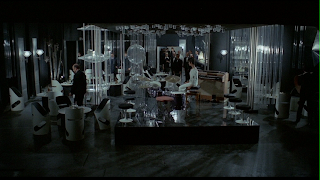Le Samourai (dir. Jean-Pierre Melville, 1967) is, if nothing else, exquisite meditation.
Since time immemorial, a valve of my heart has been exclusively reserved to pump at full capacity only while watching film noir, a fact first acknowledged when my high school film studies professor thrust Double Indemnity deep into my eye sockets, followed by The Big Sleep, The Killers, and Orson Welles' mischievously manipulated Touch of Evil (the 1975 cut). (He was a good guy, that professor, rode a mean hog, wore leather jackets, jeans, and aviators—when he wanted you to watch something, you fuckin' watched it.) The genre cut into my flesh like it was a knife, cutting until I bled, and when I bled, that blood was cold ("Jill, this blood, this looks like cold blood...").
So what I'm saying is: I'm a reptile, the responsibility for which falls squarely at the feet of [Dr. Octagon] (or Capcom?); and that I enjoy noir is no surprise—it's embedded in my cold, cold blood.
The first time I watched Le Samourai, I was in complete disbelief. Where had this film been all my life? It had taken me 6 years since Double Indemnity to watch this? How could that be? Well, I suppose it's availability may have been marginal up until its resurrection as a member of the Criterion family, but the point is, including that as an excuse, it was still inexcusable that I had never even heard of it. Why hadn't this been thrust into my eye sockets? (Or the more apropos location of my belly?)
Not that I have a VHS Deck in my abdomen; I envision a dubious transaction on the streets of Chinatown where the local bootlegger hands it off to me in a forceful fashion as I walk past, dropping my cash at his feet.
Because my life is noir as fuck.

Le Samourai is transcendent, style sublimating into substance; the sharp existentialism of assassin du jour, Jef (played to perfection by Alain Delon), puts all other cinematic killers to shame. Outdoor shots are thick with rainy-Sunday atmospherics accompanied by a melancholic electric-organ theme that hypnotizes; interiors often labyrinthine (note the first scene inside the Police Department), confusing the senses with unexpected doorways, extras as subterfuge, and post-bop jazz. Actual acts of violence are few and far between; the story is about accepting the consequences for those actions that you willfully performed, few as they may be. And as you sit, entranced by the 24fps sequence of events that unfolds, you will come to understand as Jef understands: life is not something to be taken lightly, but it can be taken quickly.

The collaboration between Melville and Delon produced two of the greatest crime-dramas in history (Le Cercle Rouge being the other. They also worked together on Un Flic, but I've yet to see it. So maybe they went 3/3. I'd believe it.). Melville's direction is refined, so enthusiastically intellectual, philosophical even, that it seems at odds with a genre that some might instinctively consider hyper-masculine (see: Heat). But that's just some gender-bias bullshit. Of course it took a careful, nuanced director with vision to craft a film like this and not have it devolve into some shitty tale of revenge (which in some respects it may resemble). When Jef is betrayed by the woman he's betrayed his woman with, he knows what he has to do. But do we?

Melville uses his actors to meditate on what may or may not be an actual quote from Bushido code, but whether the quote is real or imagined is irrelevant—Le Samourai makes it real through a process of semiotic transmutation. And we, the viewer, meditate on whether or not we need to watch this damn movie again.
I vote yes.




No comments:
Post a Comment